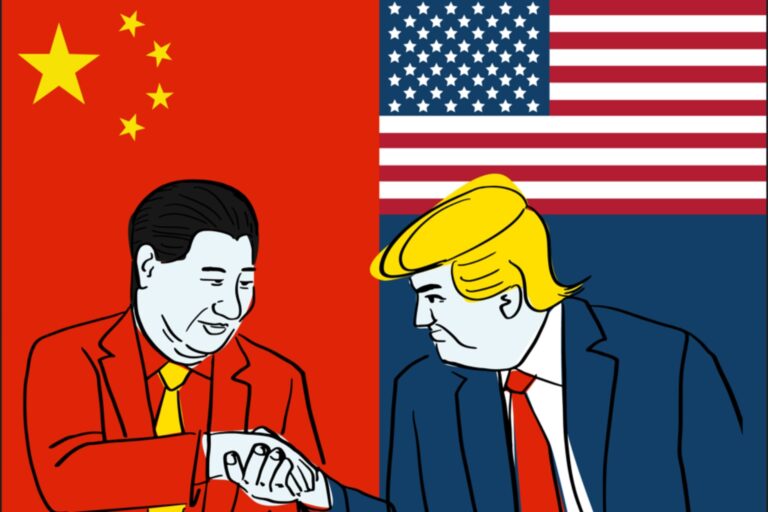Venezuelans protest against the Maduro government in Guatire, Venezuela.
Vincent A. Dueñas
The Enduring Legacy of Chavismo
The real enduring legacy of Chavizmo is that, as a movement, it appeared to advocate the elimination of abject poverty and giving the poor a voice in politics. Subsequently, it converted that political voice into a political will that, unfortunately, existed solely to keep Chavez in power[2]. The poor in Venezuela are now a voting block that can be reorganized once a modicum of democratic traditions is restored to the country. Chavez’s ability to stand up to the US and the most powerful nations of the liberal world order created an inspirational movement that he likened to Simon Bolivar’s fight against the Spanish colonial empire. Unsurprisingly, a significant portion of Venezuela still views Chavez as a true representative of the people.
Deeper analysis of the record of Chavez’s government and now Maduro’s government reveal a much bleaker legacy, but Maduro and the United Socialist Party of Venezuela (PSUV) machine still work to maintain Chavez’s venerated image[3]. It is possible that Maduro’s abysmal performance, combined with Chavez’s untimely death, actually works to obscure Chavez’s political and economic failings and immortalize him as a saint to many Venezuelans. It is, therefore, from this realization that future governing parties must consider how they will forge a new path while acknowledging Chavez’s perceived contributions to Venezuelan political and economic development. To successfully govern Venezuela after Maduro, a measured rejoinder to Chavez’s historical indiscretions must be maintained while the country’s policies chart a new course.
Today the PSUV is a mostly united coalition of socialist parties that function in the shadow of Chavez’s legacy, but under the tutelage of Maduro’s ineptitude. In addition to rampant charges of corruption and cronyism, the party is paralyzed by the control exerted by Maduro and his closest circle of Chavista loyalists. These are personalities that ideologically appear to be socialists but, in reality, operate the oligarchy that manages the illicit narco-activities and brokers the skimming of top-line dollars from the sale of oil. If the situation does not devolve into an outright dictatorship where authoritarian rule is not veiled behind the specter of a shell democracy that still holds elections, then the political process should continue in Venezuela with Maduro conceding no foreseeable advantage to the opposition.
It is unclear exactly how Maduro plans to bide the tide of increasing inflation and lack of access to basic goods and medicine without drastically changing the dynamics of his actions. China does not appear willing to provide any further financial support to Venezuela beyond preventing it from defaulting. And even if Venezuela continues to limp along as a humanitarian and human rights disaster, the Maduro government could conceivably exist in this semi-catatonic state through 2018. By maintaining the levers of judicial and military control firmly within his grasp and rendering the legislature impotent beyond verbal outcries Maduro could maintain authoritarian control. By continuing to tout the country’s sovereignty and capacity to fulfill oil exports, it would prevent any major foreign external intervention into its internal affairs other than the occasional diplomatic gaffe, such as the more recent vote of no confidence by Mercosur in its role as president of the trade bloc.
Under these conditions, the country would most likely continue on the path to hold elections in 2018 and shift its problems onto the next leader. This is the most likely course of action that will materialize absent a catastrophic refugee problem that forces the involvement of its neighbors, Colombia and Brazil, or the manifestation of a violent uprising or insurgency that results in atrocities and instigates an international response.
In this scenario, the PSUV could successfully retain popular support and ensure its long-term viability through the following steps:
- Begin to openly distance the party from Maduro.
- Begin to allow new younger leadership within the ranks to rise and ideologically return to the concept of a socialist state while drafting necessary austerity measures to rebalance the economy.
- Allow the fractured opposition to run for the presidency in 2018, focusing on the legislative elections and expanding the base of popular support.
- Potentially let the opposition win the presidency.
- (Once elections are complete) Capitalize on the narrative that the opposition is worsening the economic crisis by implementing austerity measures.
- Scapegoat the opposition president and obstruct any measures he/she seeks to implement.
- Consider a predetermined move to institute a recall referendum vote against the opposition president.
- Invoke the name and memory of Chavez at every opportunity to emphasize the legitimacy of his legacy.
- Seek to increase the division within the opposition so that they cannot organize.
For the Democratic Unity coalition (MUD) and the opposition, the key to successful governance will come from co-opting Chavez’s message of a social safety net for all Venezuelans. In a post-Maduro scenario, they could seek to do the following:
- Reduce differences to negligible levels and unite under one clear banner that is committed to staying united.
- Co-opt the Chavismo message of a Bolivarian Revolution into a message of “Venezuela for Venezuelans”; invoke the image and sentiment of Chavez as powerful historical figure.
- Organize into a legitimate political machine that can operate throughout the country and attempt to redefine the image of the opposition for poor populations.
- Run an aggressive national campaign for the 2018 presidency and emphasize the return to democracy after the end of Maduro; if running against Maduro, aggressively invoke the spirit of Chavez to emphasize the spirit of democracy to which Venezuela can aspire.
- (If elected to the presidency) Quickly move to reestablish freedom of the press by decree and establish new election schedule.
- Launch an aggressive propaganda effort to explain coming austerity measures and what citizens can expect in terms of social benefits.
The central theme within these two possibilities is the immediate acknowledgement of a common outlook on the positive aspects of Chavez’s legacy to avoid disaffecting his strong base of support. Many Chavistas today do not look favorably on Maduro and see him as corrupting Chavez’s legacy,[5] so there appears to be an opportunity for the opposition to capitalize such sentiments to further their goals. Conversely, the PSUV can scapegoat Maduro for all the ills of the country while maintaining the venerated image of Chavez and strengthening their base of support.
Venezuela desperately needs to enact some measure of economic austerity in certain areas of social spending to limit inflation. To the extent that a new president can stabilize the government, China may be willing to inject more capital to support the new government and secure their interests. The socialist state model that Chavez envisioned has only proven to work when oil and commodity prices are high and Venezuela can afford whatever it wants. This model is not sustainable, but can be adjusted to provide for basic social needs while diversifying the economy and establishing rule of law and regulatory frameworks to enable certain companies to enter the Venezuelan market.
The glaring difficulty in Venezuela’s future, however, will come from the lawlessness resulting from the convergence of illicit activity with state-sanctioned complicity. The depths of corruption in Venezuela are not fully understood in terms of true dollar amounts and the extent of government involvement is not clear. To be sure, the military and PSUV are involved, but it is unknown just how far down the ladder it goes. The system that Chavez set up worked as a patronage network and the flow of money from oil or narco-trafficking to support of the state apparatus is simply not known. Since the problem has pervaded Venezuelan politics since the country first discovered oil, the most prudent course of action for any new government seeking to truly improve the country, is to consider some forgiveness law that would reduce or extinguish sentencing in exchange for compliance and return of lost funds. In this way, the country could conceivably move forward relatively quickly from what will probably be a deeply traumatic process.
Conclusion
The Venezuelan tradition for democracy holds a particularly strong grip on society today as the opposition has so far not chosen to escalate their grievances to violent levels. Additionally, Maduro, to his credit, has not called for violent retaliatory measures against the opposition, although political imprisonment has been a hallmark of his presidency. The most disconcerting factor in the case of Venezuela has been President Maduro’s inability to handle the dramatic devolution of the Venezuelan economy and abject lack of capacity to provide leadership to the country apart from propaganda measures. The degree of popularity and control that he retains appears to be a combination of Chavista loyalism for Chavez’s hand-picked successor and the government’s capacity to extinguish free press and objective analysis within its borders. The future of the country and any legacy of the Bolivarian Socialist state hinges on his removal from any position of authority. The future also demands that Chavez’s legacy – for the short-term at least – be given some measure of decorum by the opposition.
A similar comparison for the argument recognizing mixed popular sentiments toward a dictator’s legacy can be drawn with how Chile handled the dictatorship and legacy of Augusto Pinochet. At first, Chilean society respected his position as a former leader and made him Senator for life. Though he was ultimately implicated for his human rights crimes, – thus, in a way, legitimizing his leadership. Chile acknowledged for what Pinochet was guilty and simultaneously acknowledges that there were positive outcomes from his time in power. This sort of national understanding provides time for all sides to heal. Perhaps in time, Venezuelans can study Chavez both with disdain and admiration for all that he is guilty of and for all that he can be given credit.
Vincent A. Dueñas is a recent graduate of the Master of International Public Policy degree program at the Johns Hopkins School of Advanced International Studies in Washington, DC. He is a US Army Foreign Area Officer focused on Latin America with experience living and traveling throughout the region. This paper was written to fulfill a course objective and the views reflected are his own and do not represent the opinion or official position of the United States government or any of its agencies.
________________________________________________________________________________
[1] Francisco Enrique González, Creative Destruction?: Economic Crises and Democracy in Latin America (Baltimore: Johns Hopkins University Press, 2012), 226-9.
[2] Javier Corrales, “Chavismo after Chavez,” Foreign Affairs, January 4, 2013, https://www.foreignaffairs.com/articles/venezuela/2013-01-04/chavismo-after-ch-vez.
[3] Ibid.
[4] HBO and Council on Foreign Relations, What to do about Venezuela, Web Video Series, 1:13:30, October 27, 2016, http://www.cfr.org/venezuela/hbo-do-venezuela/p38427.
[5] Peter Wilson, “Chavismo in Pieces: Why Maduro Lost and What Will Come Next,” Foreign Affairs, December 7, 2015, https://www.foreignaffairs.com/articles/venezuela/2015-12-07/chavismo-pieces.
[6] Douglas Farah, “Convergence in Criminalized States: The New Paradigm,” in Beyond Convergence: World without Order, ed. Hilary Matfess and Michael Miklaucic (Washington, DC: Center for Complex Operations, National Defense University, 2016), 182-3.



